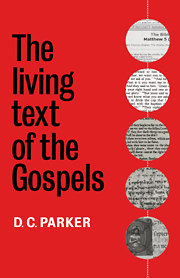Book contents
- Frontmatter
- Contents
- Preface
- List of abbreviations and frequently cited works
- 1 The theory
- 2 The materials
- 3 The practice
- 4 ‘As our Saviour taught us …’: the Lord's Prayer
- 5 The sayings on marriage and divorce
- 6 The story of the woman taken in adultery
- 7 Secrets and hypotheses
- 8 The endings of Mark's Gospel
- 9 The last three chapters of Luke
- 10 The development and transmission of the Fourth Gospel
- 11 From codex to disk
- 12 The living text
- Index of citations
- Index of Greek New Testament manuscripts
- Index of names and subjects
9 - The last three chapters of Luke
Published online by Cambridge University Press: 05 June 2012
- Frontmatter
- Contents
- Preface
- List of abbreviations and frequently cited works
- 1 The theory
- 2 The materials
- 3 The practice
- 4 ‘As our Saviour taught us …’: the Lord's Prayer
- 5 The sayings on marriage and divorce
- 6 The story of the woman taken in adultery
- 7 Secrets and hypotheses
- 8 The endings of Mark's Gospel
- 9 The last three chapters of Luke
- 10 The development and transmission of the Fourth Gospel
- 11 From codex to disk
- 12 The living text
- Index of citations
- Index of Greek New Testament manuscripts
- Index of names and subjects
Summary
It is impossible to write except by making a palimpsest of a rediscovered manuscript
Umberto Eco, The Island of the Day BeforeHitherto we have studied small blocks of material, a dozen verses or so at most, which either show extensive variation or are altogether secondary. In this chapter we study a different phenomenon, the effect on a longer passage of a number of variations scattered through it. At the same time, we are able to observe the way in which traditions, and with them texts, continued to grow and to change in the earliest centuries and beyond.
The final chapters of Luke are the most suitable for this study. The whole text of Luke has, as we have discovered on several occasions already, been the subject of extensive revision. The most notable of all such assaults was that of Marcion, and there can be little doubt that his drastic revision had an unsettling influence on the text, even if direct influence is found but rarely. It is in the final chapters that uncertainty about Luke's text becomes most prominent, not only among the ancient witnesses to the text, but also among modern scholars. Significantly different versions of the last two and a half chapters of the Gospel have been accepted in the last 120 years.
We are fortunate in having to hand a recent and exhaustive edition of the material, in the International Greek New Testament Project's edition.
- Type
- Chapter
- Information
- The Living Text of the Gospels , pp. 148 - 174Publisher: Cambridge University PressPrint publication year: 1997



